- Joined
- Mar 11, 2013
- Messages
- 14,344
- Points
- 113

On September 27, the people of the Armenian Republic of Artsakh in the South Caucasus, also known as Nagorno-Karabakh, woke up to the shelling of the military forces of Azerbaijan.
Azerbaijani forces have since indiscriminately shelled the civilian areas of Artsakh including its capital, Stepanakert. Many residential areas have been largely destroyed by Azerbaijani bombardment. Half of the population have been displaced, the region’s rights ombudsman Artak Beglaryan said on October 7.
In the small town of Martuni in Artsakh, shells have torn through roofs, leaving piles of rubble and shattered glass, AFP news agency reported.
While the town is around 20 kilometers (15 miles) from the front line of the heavy fighting, Azerbaijan’s armed forces began bombarding central streets and the local government headquarters with Grad rocket launchers as a team of AFP journalists were talking to residents at the scene.
The shelling injured two French journalists from Le Monde newspaper and two Armenian journalists.
Artak Aloyan, a 54-year-old construction worker, had taken shelter in his small dark cellar with his neighbour, an elderly woman in a headscarf who was sitting on an iron bedstead. Since Sunday he has rushed to take refuge here every time rockets start whizzing in.
“They’re firing at houses, they’re firing on people. It’s barbaric,” said 38-year-old Karun Abrahamyan, the sales assistant at a grocery store.
“We don’t go anywhere at night. My friend and I stay in the garage. From midnight, we hear the sound of shelling; we don’t know what to do,” she said.
Meanwhile, Azerbaijan has violated two humanitarian ceasefires, one brokered by Russia, the other brokered by France, and continued shelling civilian areas.
Azerbaijan’s president Ilham Aliyev and Turkey’s president Recep Tayyip Erdogan refer to Artsakh as “Azerbaijani lands,” but Artsakh has been a province of historical Armenia since ancient times, and largely maintained a semi-independent status as a predominately Armenian region.
Artsakh was acquired by Russia in 1813, and in the early 1920s Soviet dictator Joseph Stalin granted it as an autonomous oblast to Soviet Azerbaijan, although the region was mostly Armenian. Following the collapse of the Soviet Union, in response to Azeri pressures and persecution, Artsakh declared its independence on September 2, 1991 from Soviet Azerbaijan, which declared its own independence in the same year. Azerbaijan, however, did not respect the right to self-determination of the Armenian people and attacked them — an attack that turned into a four-year war. The war destroyed many Armenian towns and villages in Artsakh and killed 30.000 people.
Twenty-six years after the end of that war, Artsakh is still diplomatically unrecognized and is once again under attack, not only by Azerbaijan and Turkey, but also by international terrorists. News organizations including Reuters and the BBC, as well as the Guardian and the Independent have reported that Turkey has deployed jihadist terrorists from Syria to Azerbaijan to fight against Armenians. Russia, France and Syria have also accused Turkey of using Islamist fighters in its war against Armenians.
Why are Turkey and Azerbaijan, two Muslim Turkic states of about 100 million people, violently attacking and destroying the Armenian homeland of Artsakh, whose population is about 150,000?
This war appears to be part of a greater agenda of Turkey: Erdogan has set some benchmarks for the years 2023, 2053 and 2071.
The year 2023 will be the 100th anniversary of the establishment of the Turkish republic in 1923.
The year 2053 will be the 600thanniversary of the fall of Constantinople (Istanbul) to the Ottoman Turks in 1453.
And 2071 will be the 1,000th anniversary of the 1071 Manzikert (Malazgirt) battle, during which Turkic tribes from Central Asia invaded the Greek Byzantine forces in the then-predominantly Armenian city of Manzikert.
Before these anniversaries, the Erdogan government aims to achieve some “victories,” including territorial expansion. Erdogan has accelerated his rhetoric of neo-Ottomanist expansionism and conquests in recent years.
